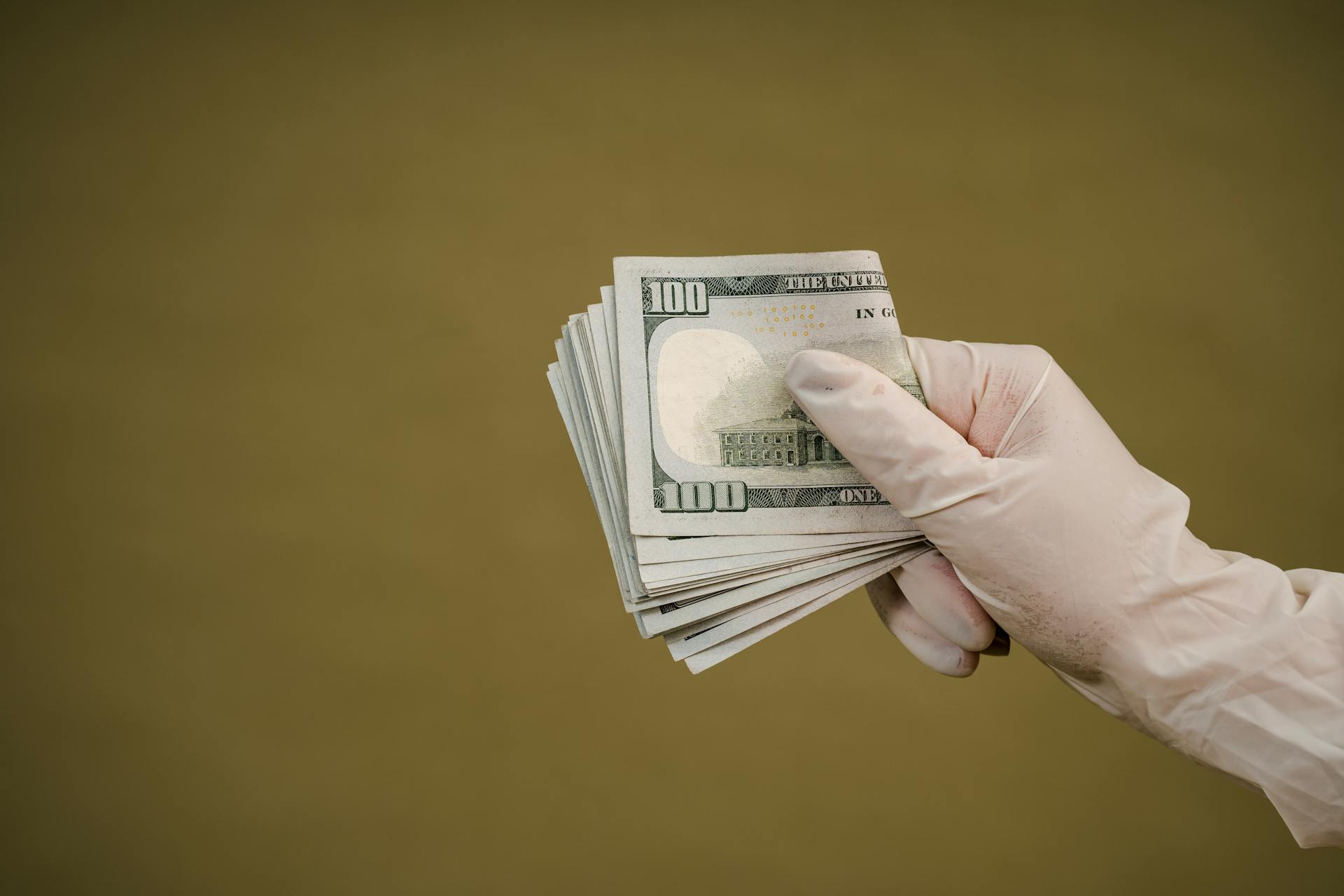
Banks typically hold a check for a few days to ensure the funds are available before releasing them to the account holder. This process is called "float" and can save the bank money on processing fees.
The exact time frame for holding a check can vary depending on the bank and the type of account. Some banks may hold checks for up to 10 business days, while others may release them in as little as 2-3 days.
In general, banks will hold a check until the funds are confirmed to be available, which can take a few days. This is especially true for larger checks or those drawn on out-of-town banks.
For example, a bank may hold a check for 5 business days to ensure the funds are available before releasing them to the account holder.
See what others are reading: Does the Bank Check Signatures on Checks
Check Deposit Process
The check deposit process can be a bit confusing, but understanding how it works can help you plan ahead and get the funds you need when you need them. Typically, it takes about one to two business days for a check to clear, but this can vary depending on the bank's policies and other factors.
Your bank's deposit agreement should outline their specific check-clearing process, so be sure to review it. The Expedited Funds Availability Act requires banks to make the first $200 of a check deposit available within one business day, although this amount was later amended to $225.
Banks may impose cutoff times for deposits, after which funds will be credited to your account the next business day. For example, if you deposit a check at a branch before the specified cut-off time, it should be available within a day or two.
Mobile banking apps often allow for mobile check deposits, which typically take one to two business days to deposit into your account. However, if you deposit a check at an ATM not operated by your bank, federal regulations require funds availability no later than five business days after the deposit.
Here are some key takeaways to keep in mind:
- Refer to your bank's deposit agreement for specific details on their check-clearing process.
- The first $225 of a check deposit must be made available by the next business day.
- Funds deposited at ATMs not operated by your bank may take up to five business days to clear.
- Check your bank's cutoff times to ensure timely deposits.
- Mobile check deposits typically take one to two business days to process.
Deposit Types and Limits
A bank may hold large deposits for an extended period, known as an "exception hold", which can last up to five days. This is one explanation of why it might take longer for a check to clear.
The exception hold applies to personal, business, and government checks, and is permitted when the total amount of daily check deposits reaches $5,525. This means smaller checks can also be put on an exception hold if they collectively reach this total.
For example, if you deposit a $2,500 check on Friday, $225 would be available immediately, and the $2,275 balance would be available on a non-holiday Monday.
A federal banking regulation known as Regulation CC covers the exceptions that allow extended holds.
Here are some key deposit types and limits to keep in mind:
- Branch deposits: typically available within a day or two, with a cut-off time that can't be earlier than 2 p.m. by law.
- Large deposits: may be held for up to five business days if the total amount is up to $5,525, but only the amount greater than that can be extended.
- International bank checks: may be held for longer due to additional processing time.
Large Deposits
Large deposits can come with longer hold times, typically up to five business days. This is because banks may hold large deposits for an extended period to ensure the funds are legitimate.
The bank can hold a check longer than two business days if the total amount is up to $5,525. This is known as an "exception hold" and can last up to five days.
Additional reading: Brokered Deposits
If your checks total less than the exemption hold amount, you might still face a delay. For example, if you deposit a $2,500 check on Friday, $225 would be available immediately.
The number of business days that the bank holds these checks can depend on your relationship with the institution. You're more likely to get the money immediately or within fewer than five business days if you have a healthy account balance and no history of overdrafts.
Here's a breakdown of the possible hold times for large deposits:
A history of overdrafts and low account balances may mean that you'll have to wait the full five business days to receive the money.
Are Good For?
Most checks are good for at least six months, or 180 days. This is a general guideline, but banks and credit unions may choose to honor checks that are more than six months old.
Some banks may have more restrictive policies, so it's always a good idea to check with your bank directly.
For more insights, see: Basel 4 Impact on Banks

If you deposit a check, your funds may be held for a certain period of time before they're available for withdrawal. This is known as a deposit hold, and the length of time can vary depending on the bank.
Here's a rough idea of what to expect:
Keep in mind that these are just general guidelines, and the actual hold period may be longer or shorter depending on your bank's policies.
It's also worth noting that some banks may place holds on checks that are more than six months old, even if they're still within the bank's acceptable timeframe.
Deposit Timing and Notification
Typically, it takes about one to two business days for a check to clear, but this can vary depending on factors such as the bank's policies and the check amount.
According to the Expedited Funds Availability Act, passed in 1987, the first $225 out of the full amount of a check deposit must be made available by the next business day.
Recommended read: How to Cash Business Check without a Bank Account
If a bank does place an exception hold on a check, it must notify the depositor of the reason and explain the expected date for funds availability, which can last no more than seven business days.
Federal law requires financial institutions to make the first $225 of a larger deposit available the next business day, and the rest on the following business day.
A bank may impose cutoff times, after which deposited funds will be credited to the account on the next business day.
Here are the key takeaways on deposit timing and notification:
- First $225 of a check deposit must be made available by the next business day
- Exception holds can last no more than seven business days
- Cutoff times may be imposed, after which funds will be credited on the next business day
- Bank must notify depositor of reason and expected date for funds availability
Funds Availability and Overdrafts
If a customer has been regularly overdrawing an account, the bank is permitted to hold funds from a deposited check for an extended period, with a review period of six months for checking accounts.
This means that if you've had no overdrafts in the past six months, you can avoid an exception hold on deposits. Banks typically want to ensure that you can cover any potential overdrafts before releasing funds.
If this caught your attention, see: Basel Iii Endgame Comment Period
If you've had a history of overdrafts, you may need to wait longer for your funds to become available, potentially up to five business days for large deposits over $5,525.
Here's a breakdown of the hold times for different scenarios:
Keep in mind that these are general guidelines, and the specific hold times may vary depending on your bank's policies and your account history.
Does Availability Require Funding?
Availability doesn't necessarily require funding. If a bank places an extended hold on a check, it may be because there's reasonable cause to believe the funds are uncollectible, such as suspected fraud.
Some checks are held for longer periods due to the amount. For example, if the check amount exceeds $5,525, only the amount over $5,525 can be held for longer.
Banks may also hold checks if there are insufficient funds in the payer's account or if the payer's account is closed or blocked. This can delay when the funds will be available for the depositor.
You might enjoy: Checks Personal Banking
A bank may hold a check for up to a week if it's from an international bank or if the receiving account is new or has been repeatedly overdrawn.
The bank may also hold a check if you've never deposited a check from that person before, and the check is for a significant amount. This is to verify the check and ensure the funds are available.
Here are some reasons why banks may hold checks:
- Reasonable cause to believe the funds are uncollectible
- Check amount exceeds $5,525
- Insufficient funds in the payer's account
- Payer's account is closed or blocked
- Check is from an international bank
- Receiving account is new or has been repeatedly overdrawn
- You've never deposited a check from that person before
In most cases, check funds will become available within two business days. However, some banks may make a portion of the check available immediately or within one business day.
Here's an interesting read: What Bank Makes Check Deposits Available Immediately
Funds Availability
Funds availability can be a mystery, but it's actually quite straightforward once you know the rules. The Expedited Funds Availability Act requires banks to make the first $225 of a larger deposit available the next business day. This means that if you deposit a check, you can expect $225 of the funds to be available in your account by the next business day.
A fresh viewpoint: Funds in Commercial Banks Are Protected by the
Some banks may make a portion of the check available immediately or within one business day, but this is not a guarantee. The rest of the check will typically become available within two business days. If you deposit a check at a bank or credit union branch, it's usually available within a day or two, as long as it's deposited before the institution's specified cut-off time.
Here's a breakdown of the typical timeline for check deposits:
- The first $225 is available the next business day
- The rest of the check is available within two business days
- If you deposit a check at the same bank where it originated, it may clear as soon as the next business day
- Certified checks typically clear one business day after depositing
Keep in mind that these are general guidelines, and your bank's policies may vary. It's always a good idea to check with your bank directly to understand their specific rules and procedures.
Frequently Asked Questions
Can I call my bank to release a hold on my check?
Unfortunately, calling your bank may not release a hold on your check, as it's often a standard banking procedure that requires time to clear. Check with your bank to confirm the status and estimated timeframe for the hold to be lifted.
Sources
- https://www.gobankingrates.com/banking/checking-account/how-long-takes-check-clear-bank/
- https://www.bankrate.com/banking/checking/how-long-for-check-to-clear/
- https://www.experian.com/blogs/ask-experian/how-long-does-it-take-for-a-check-to-clear/
- https://nccob.nc.gov/financial-institutions/banks-trusts/banking-frequently-asked-questions
- https://www.investopedia.com/ask/answers/081716/how-long-does-it-take-check-clear.asp
Featured Images: pexels.com


